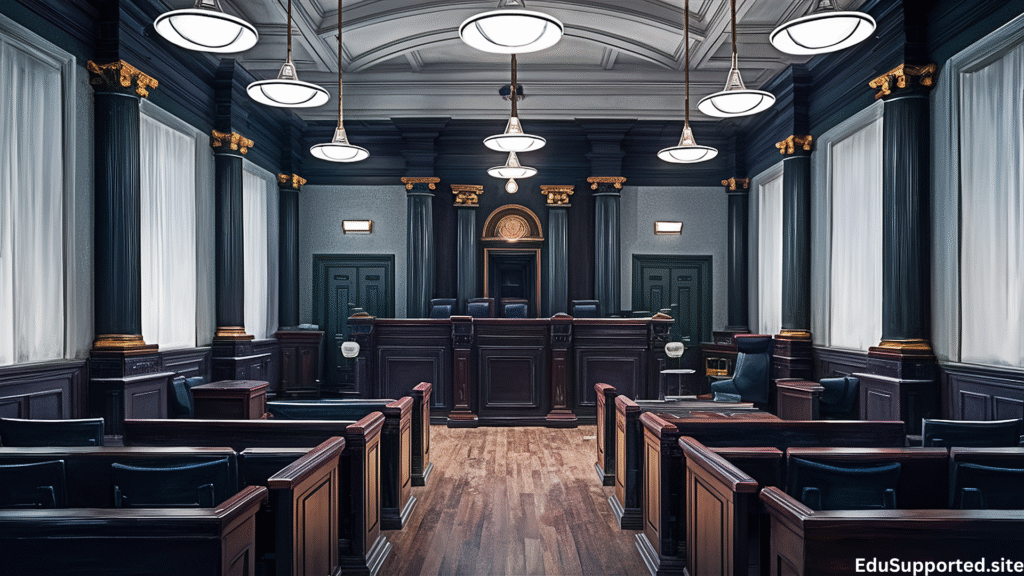The subject of student loan litigation has drawn a lot of attention lately. Student loan lawsuits are increasing in frequency as millions of borrowers struggle to pay back their obligations. Knowing what a student loan lawsuit comprises is crucial, regardless of whether you’re having problems with loan servicers, feel that debt collection techniques have violated you, or just want to know your rights. Everything you need to know about student loan litigation will be covered in this extensive book, enabling you to confidently navigate this complicated subject.
A Student Loan Lawsuit: What Is It?
A lawsuit over student loan debt is referred to as a student loan litigation. Although either lenders or borrowers may bring these claims, lenders or loan servicers often bring these cases against borrowers who have fallen behind on their student loan payments. However, due to unfair tactics, mistakes, or infractions of consumer protection laws, some borrowers sue loan servicers or debt collectors.
The following are typical grounds for student loan lawsuits:
-
Not making student loan installments on time
-
Conflicts about loan conditions or sums
-
Claims of dishonest business practices or predatory lending
-
Fair Debt Collection Practices Act (FDCPA) violations
-
Administrative mistakes or refusals of loan forgiveness
Why Is the Number of Student Loan Lawsuits Rising?
The increase in student loan litigation is caused by a number of factors:
-
Growing Student Loan Debt: More than 45 million borrowers are impacted by the nation’s student loan debt, which has risen to nearly $1.7 trillion. Many find it difficult to make their payments on time.
-
Economic Challenges: The pandemic, job losses, and economic downturns have made it harder for borrowers to repay loans, which has resulted in an increase in defaults.
-
Aggressive Debt Collection: In order to recoup outstanding debts, loan servicers and collection agencies often file lawsuits.
-
Policy Changes: Modifications to government initiatives, plans for debt forgiveness, and moratoriums have led to misunderstandings, disagreements, and even legal action.
Student Loan Lawsuit Types
1. Lawsuits brought by loan servicers or lenders
Lenders or loan servicers may bring legal action to recover the debt when borrowers default on payments. Usually, these cases include:
-
Demand that the whole loan amount be repaid.
-
Interest accrual, late fines, and collection expenses
-
Property liens, bank account levies, or wage garnishment if the court decides in the lender’s favour
2. Lawsuits Borrowers File
Lawsuits may be brought by borrowers against debt collectors, loan servicers, or lenders for:
-
Unfair Debt Collection Practices: FDCPA infractions such harassment or false advertising.
-
Loan record errors: Including identity theft, incorrect amounts, and uncredited payments.
-
Problems with Loan Forgiveness: When programs that have been offered are turned down without good cause.
-
Predatory lending: Refers to dishonest or fraudulent loan practices.
How Do Lawsuits for Student Loans Operate?
Here’s what usually occurs when a student loan lawsuit is filed:
-
Complaint Filed: The lender submits a complaint detailing the claim and outstanding balance to the court.
-
Service of Process: The litigation documents are delivered to the borrower, who has a certain amount of time to reply.
-
The borrower has three options: pay the debt, work out a settlement, or respond to the case by submitting a counterclaim or response.
-
Court Procedures: A judge may convene a hearing or the case may go to trial if the borrower challenges the lawsuit.
-
Judgement: The borrower’s debt amount and status are determined by the court. Enforcement measures such as wage garnishment may ensue if the lender prevails.
Typical Student Loan Lawsuit Defences
You may have strong defences if you’re being sued for student loans, including:
-
Statute of Limitations: The amount of time that a lender has to file a lawsuit to recover debt varies by state.
-
Proof of Payment: You have previously paid all or a portion of the loan payments.
-
Identity Theft: You are not the owner of the loan.
-
Debt Discharge: Either via bankruptcy or a program for debt forgiveness, the loan was released.
-
Servicer Errors: Inaccurate loan amounts or improper payment application.
-
Unfair Collection Practices: Harassment, threats, or other FDCPA infractions.
How to Respond to Receiving a Student Loan Lawsuit
Being notified of a lawsuit might be frightening. The following actions are essential:
-
Ignoring the lawsuit might result in a default judgement against you, so don’t do it.
-
Examine the documents carefully to comprehend the lender’s claims and desired amount.
-
Get Your Records: Compile all correspondence, payment receipts, and loan documentation.
-
React Promptly: Even if you contest the debt, you must submit a formal answer to the court.
-
Think About Legal Assistance: Speak with an attorney who focuses on consumer law or student loan matters.
-
Examine Your Settlement Options: In some cases, settlement might lower the amount or provide more reasonable conditions for payments.
Is It Possible to File a Student Loan Suit? When Do Lawsuits Get Filed by Borrowers?
In some circumstances, borrowers may bring legal action against lenders or loan servicers. Among the examples are:
-
When servicers incorrectly ask for debt forgiveness or fail to execute payments
-
If identity theft occurs but the lender still requests payment
-
When debt collectors violate the law by harassing or threatening you
-
If you obtained the loan via dishonest means or fraud
One approach to get damages, fix loan records, or force the lender to take action is to file a lawsuit.
Effects of Student Loan Lawsuits on Finances and Credit
Your money and credit score may be significantly impacted by a student loan litigation. Here’s how:
-
Court rulings: They may stay on your credit record for seven years.
-
Wage Garnishment: Employers may withhold up to 15% of employees’ disposable income.
-
Bank Account Levies: You may have money taken straight out of your accounts.
-
Tax Refund Offset: Your debt may be offset by federal or state tax refunds.
-
Extra Expenses: Interest, court costs, and lawyer fees may raise the overall amount due.
Knowing these effects emphasises how important it is to deal with student debt problems early on.
Alternatives for Student Loan Lawsuits
Take into account these options if you wish to prevent or settle lawsuits:
-
Loan Rehabilitation: Making timely payments to eliminate default status.
-
Loan Consolidation: Combining loans to reduce monthly payments.
-
Income-Driven Repayment Plans: Modify payments in accordance with income.
-
Debt Settlement: Negotiating a lower payment amount.
-
Bankruptcy: Only in extreme circumstances, where there is evidence of excessive hardship, may certain student debts be cancelled.
Ways to Avoid Student Loans Legal Action
Litigation is not as good as prevention. To stay out of legal trouble:
-
Remain informed by monitoring your loan amounts, interest rates, and due dates.
-
Talk To Servicers: Get in touch with servicers as soon as possible to discuss your alternatives if you are unable to pay.
-
Apply for Forgiveness: Verify your eligibility for Public Service Loan Forgiveness and similar programs.
-
Maintain Records: Keep track of all correspondence and payment confirmations.
-
Seek Assistance: If you’re having trouble, get legal help or nonprofit credit counselling.
Most Recent Developments in Student Loan Cases (2025 Update)
-
Congress and the Biden administration are now engaged in a heated debate over proposed student debt modifications and forgiveness initiatives.
-
The federal and state laws’ safeguards for borrowers are still being clarified by court decisions.
-
More debtors are going to court to contest loan servicer practices.
-
Lawsuits have temporarily decreased as a result of COVID-19-related payment suspensions, but many anticipate a spike after the respite period ends.
-
Apps and digital tools are being developed to assist borrowers in monitoring their loans and preventing defaults.
In Conclusion
Anyone with student debt has to understand what a student loan lawsuit is. Understanding the legal environment enables you to make wise choices, whether you’re a borrower who is being sued or someone who wants to defend your rights. You may better handle your student loan difficulties and steer clear of expensive legal repercussions by reacting quickly, considering your options, and getting expert guidance.
